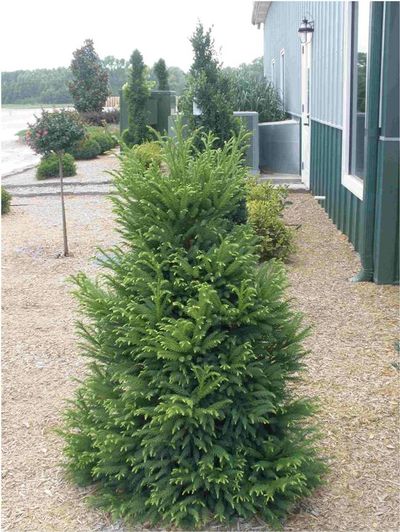Dwarf Giokumo Cryptomeria Provides Year-Round Interest
Park Hill, OK-- Giokumo Cryptomeria is an easy care, evergreen dwarf Cryptomeria japonica selection with year-round interest introduced by Garden Debut® in late 2011. This compact, densely pyramidal Japanese Cedar has a vigorous growth rate. Early growth in the first 3-4 years is mounding and spreading, but it matures at a height between 8-10 feet tall and about 6-8 feet wide after 20-30 years. For added interest, Giokumo sports persistent, cinnamon-colored decorative female cones about ¾ inch long.
Giokumo Cryptomeria has beautiful, deep green coloration and 3/8-inch long, spirally-arranged, awl- shaped needles that curve inward. Numerous flexible branchlets are green and thickly covered with these short, spiraling needles, creating a thick, dense habit. Branchlets are eventually deciduous, typically lasting 3-4 years.
This pyramidal dwarf conifer has a stout trunk and is graceful in habit. In exposed areas of U.S.D.A. Zones 6-9 (-10 degrees to 0 degrees F.), Giokumo exhibits a coppery or bronzy winter color, particularly when exposed to wind.
This genus is native to Japan and China although it is classified in the Taxodiaceae with the bald cypress and redwoods of North America. Landscape uses for Giokumo include: specimen use adding color, form and texture, winter interest, add height to a mixed border, use on seacoasts, as a privacy screen or backdrop for perennial or rose gardens or contrasting seasonal shrubs, planted in small groves and planted at the sunny edge of woodlands.
Best in full sun it will tolerate light shade in a location sheltered from high winds. Achieve maximized growth is on rich, deep, permeable, average to slightly acidic, well-drained soils, with abundant moisture, although Giokumo will grow on a broad variety of soil types. Keep newly planted trees moist for the season after planting while the roots grow into the native soil and add an organic mulch to maintain soil moisture levels. After becoming established, Giokumo Cryptomeria has average watering needs.
The beauty of the dwarf conifer is its versatility in the modern landscape. Giokumo is ideal in scale and provides horticultural interest for today’s gardens Reduced maintenance required by this dwarf cultivar syncs with faster contemporary lifestyles. Giokumo has great resistance to insects and diseases, as well as improved hardiness and general ease of growth.
For more information on Giokumo Cryptomeria and other superior plant introductions from Garden Debut®, visit www.gardendebut.com.
Statistics Chart for Giokumo Cryptomeria, Cryptomeria japonica cv. Giokumo
Plant Category: Native deciduous tree, conifer
Mature Height: Reaches 8 – 10 feet in 10 years
Mature Spread: 5 - 10 feet
Mature Form: Broadly pyramidal
Branching: Dense with green branchlets, covered with short, spiraling awl-shaped needles
Growth Rate: Naturally dwarf variety, vigorous growth to predetermined max
Sun Exposure: Full sun (recommended), will tolerate light shade
Soil Type: Prefers rich, deep, well-drained soils with a good moisture supply; adaptable and will tolerate red brickyard clays of the southeast U.S.
Soil Moisture: Best on moist, well-drained soils, use organic mulch and supply regular moisture during the first season while new plantings are getting established
Cones: Conspicuous, small, brown, ½ inch male and female cones that persist
Native: Native to China and Japan
Foliage: Evergreen conifer with 4-angled, awl-shaped, 3/8 inch needles arranged in a spiral on flexible branchlets. Overall, the foliage is dense and has been described as “meaty”
Foliage Color: Beautiful, deep, rich green coloring all year long, with a coppery or bronzy winter color in exposed areas
Fall Color: Leaves turn copper or bronze color in winter, particularly if exposed to strong wind
Bark: Beautiful cinnamon-colored bark is thin and peels in narrow vertical strips
Root system: Vigorous once established, with a moderate salinity tolerance
pH Level: 5 – 8, very adaptable
Climate Zones: 6a – 9, (winter lows -10 to 0 degrees F.)
Heredity: U.S.
